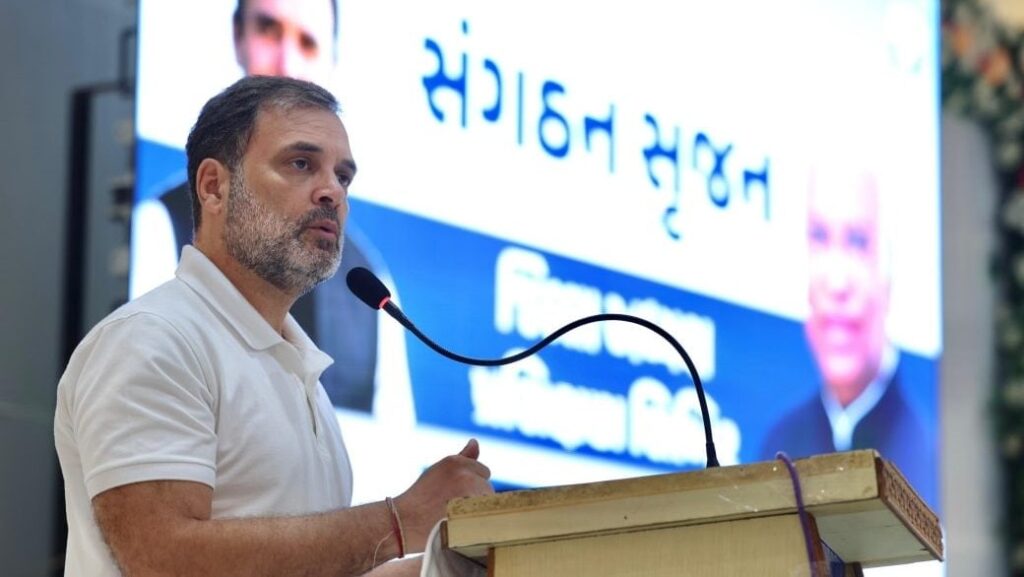For the Congress, the road to setting its house in order started from Gujarat in April with the launch of a pilot project that was subsequently rolled out in other states. Having set up District Congress Committees (DCCs) and appointed their leaders since then, the party has moved on to fixing responsibilities and re-establishing its connection with voters.
The party’s direction was further focused during a three-day training camp held for the 40 DCC and city unit chiefs starting on July 26. Rahul Gandhi also participated in the camp, with the leaders who attended saying that a roadmap for the state unit was prepared based on three key areas of focus mentioned by the Leader of Opposition: questioning electoral roll verification, conveying to voters the importance of dislodging the BJP from power in 2027, and emphasising to voters the message of the RSS and the BJP’s “high-handedness”.
The party is hoping now to work towards effective booth-level management, active involvement of workers in next year’s local body polls, and training its ground-level workers to carry out regular agitations on local issues.
“The new presidents have been given the task of restructuring their local units based on their specific needs and identified issues,” said state Congress spokesperson Manish Doshi. “A common roadmap will be prepared for the state and each unit president will customise it at the local level. This will also include strict responsibility of timely collection of electoral rolls, booth management, timely district meetings, and organising agitations to tell the voters that the party is with them.”
“The 2017 Assembly election was a very close call. If Rahul Gandhi, who was in Gujarat for only 40 days back then, could turn the results in our favour with a vote share difference of around 6-7 percentage points, we have two and a half years to work hard,” the DCC chief for Banaskantha, Gulabsinh Rajput, told The Indian Express.
Senior state Congress leaders said behind closed doors at the resort in Anand where the training camp was held, the DCC and city unit presidents were also told to ensure their presence on social media and connect with the local media. Each block-level unit of the party will be divided into mandals and sectors based on the number of local body seats. The party hopes to set up around 1,050 mandal units and over 5,000 sectoral units by August.
Congress’s Vadodara city president Rutvij Joshi, among the few to be retained for a second term, said the election of ward leaders would be carried out with inputs from local workers. “Earlier, Gujarat Pradesh Congress Committee (GPCC) leaders would decide the unit heads. However, this time, the leaders will be chosen by the party workers, which in itself is a morale booster for the party … Now, as the city president, I will select ward leaders based on feedback from local workers. Last time, I chose the ward leaders based on the opinion of influential leaders,” he said.
The DCC chief for Devbhoomi Dwarka, Palbhai Ambaliya, said senior leaders had realised that for the past several years the party did not focus on village samitis and district committees, which he called the “soul of the Congress”.
“That is the reason the DCC chiefs have been given power. We were told that the way we know the issues at the grassroots level, the Pradesh Congress Committee does not and the AICC leaders even less,” Ambaliya told The Indian Express, also expressing faith in Gandhi’s leadership.
Lost networks
State leaders said the party had long suffered because of the absence of an effective grassroots network, worn away by BJP dominance, and the lack of strong state-level leaders. “The grassroots workers acted as a bridge between party leaders and the common people. We have lost local bodies since 2021. In 2015, we put up a good show in the civic polls and the impact was seen in 2017. Over time, the party leaders also shifted focus from social outreach to election-oriented political strategies. The truth is that voters do not identify with senior leaders or party candidates in elections, only grassroots workers,” said a senior Congress functionary.
The leader said that 2017 onwards, the Congress had lost its local connections as the BJP captured cooperative unions in the khadi, bank, and dairy sectors. “The BJP took away these institutions as part of a well-planned strategy. These were the areas where we could socially connect and work with voters as we have not seen real power in Gujarat for 30 years … But, that has been taken away slowly since 2017 and its effect is being felt in the electoral performance … So, it is time to revive those connections. The election-oriented agitations have not yielded results as the bridge between voters and the party is missing.”
Another leader blamed the party’s poor booth management. “The major difference between the BJP and the Congress in Gujarat in recent times has been that they have agents in each booth, even at the taluka and district panchayat seats. The Congress has agents in only 40% booths and even they are either unaware of their powers or are easily intimidated … The party has also decided that, departing from the usual norm of individual candidates contesting the taluka and district panchayat seats, it will be directly involved from now on.
Gulabsinh Rajput said popular national-level leaders such as Wayanad MP Priyanka Gandhi Vadra, Congress president Mallikarjun Kharge, senior leaders Sachin Pilot and Ashok Gehlot, and Telangana CM A Revanth Reddy should also frequently visit the state to keep the party cadre motivated.

